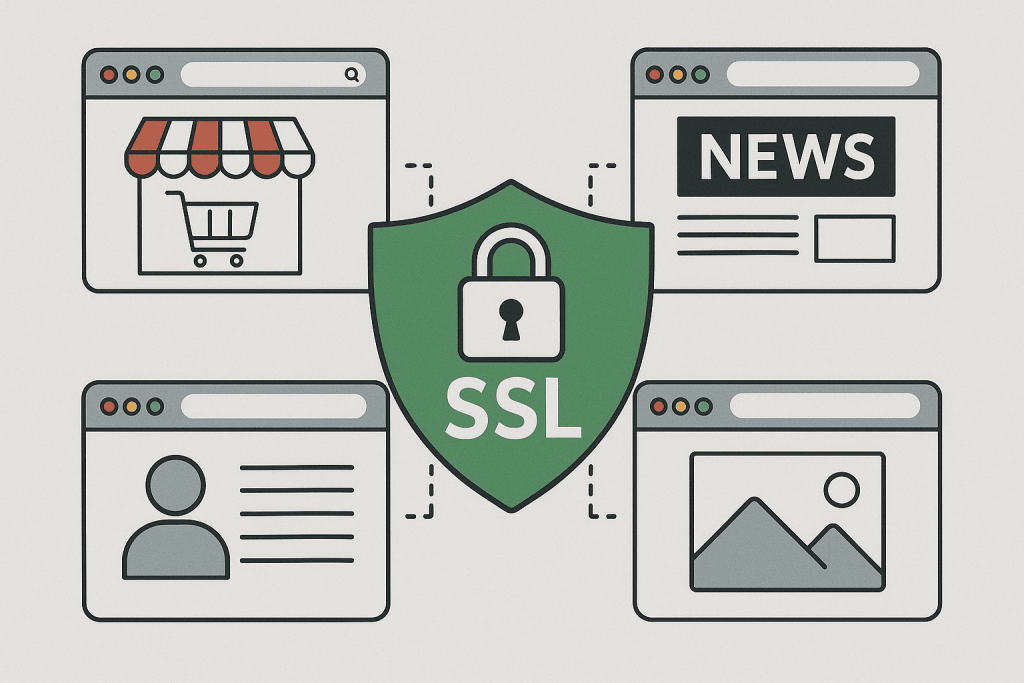
Many owners of small websites — blogs, portfolios, corporate pages, or informational resources — still believe that an SSL certificate is necessary only for sites that process online payments or collect users’ confidential data. However, this is a common misconception. Today, encrypted connections are not just a technical feature of large platforms but a universal standard that determines trust, security, and even visibility in search engines. Ignoring this factor means risking your reputation, even if your site seems “simple.”
Security as the Foundation of Trust
Even if a user doesn’t submit any personal data, they still interact with your site — browsing pages, clicking links, filling out a contact form, or subscribing to a newsletter. All these actions involve data exchange between the browser and the server. Without an SSL certificate, this traffic is transmitted in plain text and can be intercepted by third parties. Imagine a user visiting your website from a public Wi-Fi network — for example, in a café or airport. Even if it’s just a personal blog, an attacker could replace the page, inject malicious code, or redirect the visitor to a phishing site. SSL encryption prevents this by transmitting all data securely, ensuring any attempt at interference is blocked at the connection level.
Trust from Browsers and Users
Modern browsers such as Chrome, Firefox, and Safari actively warn users about insecure websites. If your site doesn’t use HTTPS, the browser displays a “Not Secure” label or a red triangle next to the address, which immediately scares off most visitors. Even if your content is valuable, many people will simply avoid staying on a page that looks unsafe. This directly affects your bounce rate, user time on site, and ultimately, brand trust. When a browser shows a padlock icon next to the address, it creates an instant sense of reliability — the user understands that the site takes their safety seriously. In a world where cyberattacks, phishing campaigns, and data leaks occur daily, even small signs of protection become meaningful indicators for your audience.
Impact on SEO and Google Rankings
Google officially confirmed years ago that HTTPS is a ranking factor. In other words, having an SSL certificate directly influences how high your site appears in search results. For small websites, this can be a decisive advantage: if your competitor offers similar content but uses HTTPS, Google is more likely to prioritize their site. Moreover, the search engine also considers user behavior — if visitors quickly leave your site after seeing a security warning, it negatively affects your ranking. Thus, an SSL certificate isn’t only about safety — it’s also about promotion. It’s a free way to improve your SEO ranking, especially when using modern certificates such as Let’s Encrypt.
Protection Against Content Tampering
Another less obvious but critically important benefit of SSL is protection from content tampering. Without HTTPS, attackers or even some ISPs can inject advertisements, phishing elements, or malicious scripts into the traffic between the server and the user. These changes not only distort your website’s appearance but can also lead to your site being flagged or blocked by antivirus software or browsers. For small projects, this can be devastating — rebuilding trust takes time. SSL ensures that all transmitted data remains unchanged, guaranteeing that visitors see exactly the page you intended them to.
A Modern Standard and a Mark of Professionalism
The internet evolves quickly, and what was once optional has now become a basic requirement. HTTPS is the new norm, while the absence of SSL looks like a sign of neglect or outdated practices. For businesses, this is especially important: even if your website is just a digital business card, users subconsciously judge your professionalism. A secure connection is a small detail that forms a strong first impression. It shows that the website owner cares about details, follows modern standards, and can be trusted. For personal blogs or small communities, it matters as well — it helps the site look current and builds respect among readers.
Security Is Not a Luxury — It’s a Necessity
An SSL certificate is not just a tool for large companies or e-commerce websites. It’s a fundamental element of the modern internet that ensures secure data exchange, strengthens user trust, and supports site growth. Even if you don’t collect passwords or process payments, HTTPS protects you from tampering, traffic loss, and reputational damage. In other words, it’s an investment not only in security but in the future of your project. And today, when it’s possible to get a basic SSL certificate for free, refusing to use one is like leaving your website’s door wide open in a world where reliability and trust matter more than ever.

Leave a Reply